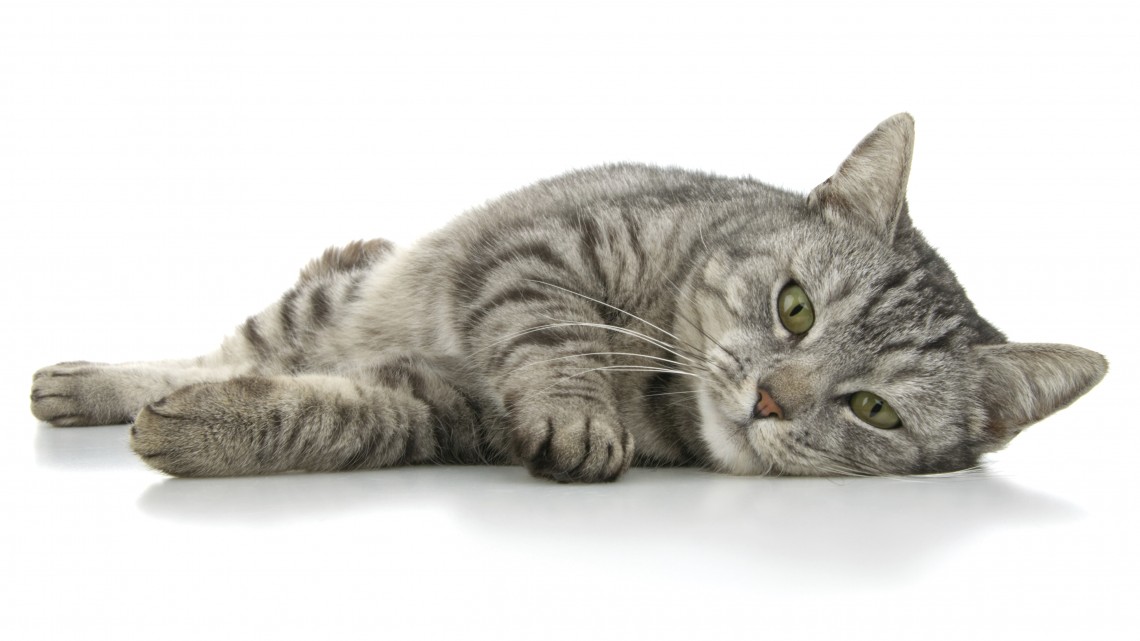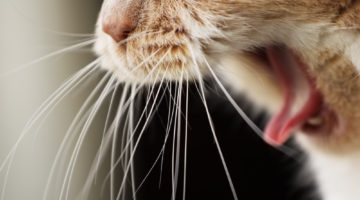Contrary to popular opinion, cats can get heartworm. Here’s what you need to know to protect your feline friend.
Do cats get heartworm? Back when I was in vet school, we didn’t think so. We now know they can, and do. In fact, a recent University of Auburn Veterinary School study revealed that feline heartworm disease is expanding and cats are more at risk than previously thought.
Where does it come from?
Heartworm is transmitted by mosquitoes and is more common in some regions than others. Higher concentrations of the disease occur in warmer, wetter climates such as the southeastern U.S. coast. It’s also prevalent on the Gulf Coast and up the Mississippi River. However, any area with rain and heat (including New Jersey, where I’m from!), has seasonal heartworm. Interestingly, pockets along the West Coast often correspond with populations of California sea lion, which is also a host of heartworm parasites.
Heartworm is not as big a problem in Canada as it is in warmer, more humid regions of the U.S., but it still occurs. “Hot spots” include southwestern Ontario and the southern parts of Manitoba, Quebec and British Columbia.
Feline versus canine
Heartworm manifests differently in cats than it does in dogs. In dogs, classic heartworm disease presents as heart failure, trouble breathing and coughing. In cats, the main presentation is an asthmatic type syndrome, or even sudden death.
Dogs typically get many worms in the heart, but cats often get only one or two. While heart muscle damage occurs in dogs (and can also occur in cats), the most significant damage in cats occurs in the lungs and is caused by the immature larval heartworms.
Higher concentrations of the disease occur in warmer, wetter climates such as the southeastern U.S. coast.
H.A.R.D. is thought to be caused by an immune reaction to the larval stages of the heartworm, and/or the death of larvae or adults. Even infection with heartworm larvae alone is enough to cause H.A.R.D. The treatment for acute cases is oxygen and steroids.
Testing pros and cons
Heartworm testing in dogs is simple and straightforward, but it’s not the same for cats. A cat can actually test negative for adult heartworm, but still be suffering from significant lung damage from the larvae (H.A.R.D.). In dogs, a simple heartworm antigen test is done. The antigens are given off by adult heartworms and since there are usually multiple worms, there is plenty of antigen to test positive.
In cats, we do what’s called an antibody/antigen test, though often the results are difficult to inter- pret. A positive antibody test indicates larval infection, but not necessarily the presence of adults. A positive antigen test is diagnostic of adult heartworm, but false negatives do occur since the number of worms is low in cats.
Ultrasound can also be used to actually see the heartworms. Again, this is easy in dogs, due to the large number of worms, but a single worm in a cat could be missed.
What can you do?
There is no approved treatment for the safe removal of adult heartworm in cats. Low dose aspirin or steroids are
sometimes used to decrease inflammation/allergic reactions and to reduce incidence of emboli.
The good news is that you can prevent heartworm from infecting your cat to begin with. Start by talking to your vet and finding out what the prevalence and incidence of heartworm is in your region. If heartworm cases are extremely low where you live, then the chances of your cat becoming infected are also going to be low, although it could still happen since heartworm has been found in nearly every state and province. If heartworm is a major problem in your area, then you definitely need to consider some form of prevention.
There are two primary forms, a chewable tablet containing Ivermectin, and a topical “spot on” containing selamectin. Since they need only be given once a month, protecting your cat from this deadly disease is simple. Although these products are chemicals, they are nevertheless currently the best way to prevent your cat from getting heartworm. They are safe enough to use in both lactating females and in kittens as young as eight weeks. And in our opinion, they’re necessary, especially given the seriousness of the disease and the difficulty in diagnosing and treating it in felines.
Wherever you live, it’s important to educate yourself about heartworm, assess your cat’s chances of getting infected, and take what steps you need to ensure she stays healthy when the weather turns warm and the mosquitoes come out.
More Ways To Help Protect Your Cat
- Keep her indoors, especially around dawn and dusk, when mosquitoes are most active, and/or if you live near a pond or wetland where the insects breed.
- Make sure window and door screens fit properly and have no holes in them.
- look for a natural insect repellent that can be safely used on felines.
- Don’t use essential oils as a repellent – they’re toxic to cats.
- Keep your cat’s immune system healthy by feeding her a high quality diet and minimizing vaccines.







No Comment